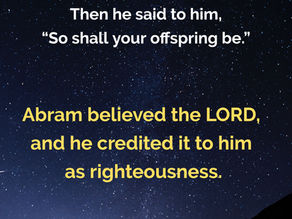John 6:35-40 - The Fork in the Road
- Chad Werkhoven
- Apr 22, 2024
- 4 min read
What do you think? Do you have free will or not?
John 6:35-40 (NIV)
35 Then Jesus declared, “I am the bread of life. Whoever comes to me will never go hungry, and whoever believes in me will never be thirsty. 36 But as I told you, you have seen me and still you do not believe. 37 All those the Father gives me will come to me, and whoever comes to me I will never drive away. 38 For I have come down from heaven not to do my will but to do the will of him who sent me. 39 And this is the will of him who sent me, that I shall lose none of all those he has given me, but raise them up at the last day. 40 For my Father’s will is that everyone who looks to the Son and believes in him shall have eternal life, and I will raise them up at the last day.”
41 At this the Jews there began to grumble about him because he said, “I am the bread that came down from heaven.” 42 They said, “Is this not Jesus, the son of Joseph, whose father and mother we know? How can he now say, ‘I came down from heaven’?”
43 “Stop grumbling among yourselves,” Jesus answered. 44 “No one can come to me unless the Father who sent me draws them, and I will raise them up at the last day."
Listen to passage & devotional:
Belgic Confession of Faith, Article 14: The Creation and Fall of Man
Man subjected himself willingly to sin,
becoming wicked, perverse, and corrupt in all his ways.
Therefore we reject everything taught to the contrary
concerning man’s free will,
since man is nothing but the slave of sin
and cannot do a thing
unless it is “given him from heaven.”
For who can boast of being able
to do anything good by himself,
since Christ says,
“No one can come to me
unless my Father who sent me
draws him”?
Who can glory in his own will
when he understands that “the mind of the flesh
is enmity against God”?
Who can speak of his own knowledge
in view of the fact that “the natural man
does not understand the things of the Spirit of God”?
In short,
who can produce a single thought,
since he knows that we are “not able to think a thing”
about ourselves,
by ourselves,
but that “our ability is from God”?
And therefore,
what the apostle says
ought rightly to stand fixed and firm:
“God works within us both to will and to do
according to his good pleasure.”
For there is no understanding nor will
conforming to God’s understanding and will
apart from Christ’s involvement,
as he teaches us when he says,
“Without me you can do nothing.”
Summary
"If God would only write my name in the sky, or send an angel to speak directly to me, or perform some other miracle, then I'd believe..." Such is the confession of an atheist or agnostic as they explain that there just isn't enough evidence for them to accept the premise of an all supreme, yet immanently personal God.
But in today's passage, Jesus demonstrates that there will never be enough evidence. He's speaking with people who long for the bread of God from heaven (v32-33), but yet who refuse to believe in the Son of God, even though He's been performing all sorts of miracles and is now speaking to them directly.
It's not a lack of evidence that makes Christianity, or even theism in general, so hard for some to accept. "The heavens declare the glory of God; the skies proclaim the work of His hands (Psalm 19)." The Son of God came and lived among us, performing any number of miracles, culminating with His resurrection and ascent back into heaven, as recorded by four very different Biblical writers and multiple extra-biblical records.
No, the problem isn't with the evidence, it's with us. It's our sinful pride and arrogance, driven by the deep urge to make ourselves god, which we inherited from Adam. Man's sinful nature will never independently seek reconciliation with God. "No one has the ability to come to me," said Jesus, "unless my Father hauls them in (v44 - literal translation)."
Dig Deeper
Up till now, as we've tracked through the Belgic Confession of Faith this year, we've worked through doctrines that Christians from nearly every denominational tradition could support. But it's here in Article 14 that we've arrive at a fork in the road. As Reformed Christians, we confess that "we reject everything taught to the contrary
concerning man’s free will."
For many Christians, this is a step too far. Their problem isn't that they don't think we need God's grace; They'd certainly agree that our sin makes us so sick that we'll die unless we feebly sit up and take the sweet medicine of God's grace. But they cling to our own free will as being the final arbiter of our eternal destiny: every person has a choice to either humble themselves and accept God's free gift of salvation, or to die in their sin, eternally at enmity with their Creator.
The problem is that we're not just sick from our sin, we're dead in sin (Ephesians 2:1), and a dead man can't sit up and ask for, or even accept, help. Yet here Jesus says, "everyone who looks to the Son and believes in him shall have eternal life (v40)." But isn't it the case that in and of ourselves we won't and even can't look to Jesus on our own? Sadly, yes. Sin has such a strong grip on you that on your own you'd resist Christ and look the other way.
The good news here is that God overcomes your enslaved 'free' will and has "hauled you in (v44)." It's not that He drags you in kicking and screaming, against your will. We'll see over the next few weeks how He's given you a new heart and mind that now finds His grace irresistible.
ACKNOWLEDGE WHO GOD IS: Our Father, who has drawn us towards His Son, who will raise us up on the last day;
ALIGN YOUR LIFE WITH GOD'S WILL: Pray for patience and grace as we cover these difficult topics for the next few weeks, that you would understand all that God has accomplished for your salvation;
ASK GOD FOR WHAT YOU NEED:
Read the New Testament in a year! Today: Matthew 13




















Comments